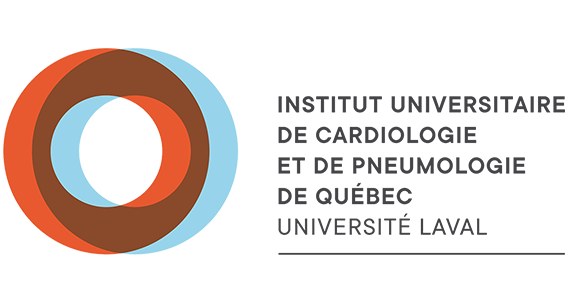Highlights 2021-2022*
A Hub for Discoveries and Training
The continued notoriety and international recognition of a research centre go through the recruitment and retention of productive researchers, training the next generation, good performance of teams, involvement of clinicians and health professionals to research programming, building strategic partnerships, obtaining grants as well as cutting-edge infrastructure development.
The year 2021–2022 was another one outstanding in developing and positioning the Research Centre, which allows it to proudly assume its leadership in its fields of expertise that are cardiology, respirology as well as obesity, type 2 diabetes and metabolism.
A Discovery by Dr. André Marette’s Team in the Rankings of Québec Science
 Through the discovery of a special bacterial signature found in certain organs in diabetics, the table is set for new clinical approaches to type 2 diabetes.
Through the discovery of a special bacterial signature found in certain organs in diabetics, the table is set for new clinical approaches to type 2 diabetes.
The team of Dr. André Marette, a researcher at CRIUCPQ, has shown that intestinal bacteria which decided to go on vacation by travelling to other tissues and organs were linked to type 2 diabetes! This finding is one of Québec Science’s Top Ten discoveries.
A World Revolution in Oxygen Therapy Treatment: a Made in Quebec Innovation Demonstrates an Invaluable Added Value in the Current Context
OxyNov is delighted to present the FreeO2 device, a care tool for oxygen therapy. Being developed in partnership with the Institut universitaire de cardiologie et de pneumologie de Québec – Université Laval (the Institute), the IUCPQ Foundation and the City of Quebec, producing this apparatus arises from a clinical research project to automate the administration of oxygen in oxygenotherapy. The FreeO2’s technology showcase will help position the Province of Quebec on the world stage and reaffirm its leadership.
This new Quebec-made device in the medical world will improve the safety of million people hospitalized receiving oxygen. The instrument automatically and continuously adapts the oxygen flow delivered to the patient according to a clinician-defined oxygenation objective and the user’s instantaneous needs. FreeO2’s operating procedure sets out the need for oxygen every second and provides optimal patient support. Knowing that the major issue for COVID-19 patients is oxygenation, FreeO2 becomes an optimal and essential treatment. Used to treat people in the Institute’s intensive care unit, the device has not only demonstrated benefits for them, it also allows a 29% reduction in the length of hospitalization for patients requiring oxygen therapy, and a significant reduction of more than 20% in costs for our health care system.
“Bad Carbohydrates” Likely Increase the Cardiovascular Risk
The risk of serious cardiovascular events or death is 21% is greater in people having a high dietary glycemic index.
A study published in the New England Journal of Medicine reports that there is an association between a diet rich in “bad carbs” and cardiovascular risk. This study, co-authored by the international PURE project team, including cardiologist Paul Poirier, from Université Laval’s Faculty of Pharmacy and the Institute’s Research Centre, demonstrates that a diet characterized by a high glycemic index is associated with an elevated risk of serious cardiovascular events and death.
Food Strategies for a Thriving Gut Microbiota Could, in Theory, Protect against COVID-19 or Mitigate its Complications
Certain food strategies favouring a healthy gut microbiota would be, at least theoretically, helpful to prevent COVID-19 or alleviate its complications. But since no large-scale clinical studies on the issue have yet been finalized, it would be premature to make it a formal recommendation. It is the main message coming out of an analysis published in Advances in Nutrition by Laurence Daoust, Geneviève Pilon and Dr. André Marette, from the Faculty of Medicine as well as from the Institute of Nutrition and Functional Foods of Université Laval and from the Institute’s Research Centre.
“There was a great amount of exaggeration going on, early in the pandemic, about the effect of certain natural compounds against COVID-19,” recalls Dr. André Marette. “Each week brought its own miracle product. It is the idea that drove us to take stock of the issue.”
Capsaicin Would Spice Up Sports Performance—a Synthesis Study Concludes That This Supplement Could Improve Resistance and Endurance
Is capsaicin, the molecule that gives red pepper its spiciness, effective or not in enhancing physical performance? After a study he conducted last August on the subject, Professor François Billaut, from the Department of Kinesiology at Université Laval and from the Institute’s Research Centre, found that capsaicin was one of the supplements earning to be rigorously tested in research.
“These compounds could be part of a nutritional strategy aimed at improving human physical performance.” — François Billaut. The fruit of this labour just came out in the International Journal of Sports Physiology and Performance.
The Institute Named Provincial Leader in a Lung Cancer Screening Project
The Institute was designated by the MSSS as a provincial leader in order to set up a showcase project for lung cancer screening. Our professionals through their expertise will put this project in place, which becomes part of our services and act as a model for partner institutions. This initiative is to deal with the population aged 55 to 74 who smoked cigarettes for 20 years or more. A risk evaluation as well as the person’s health assessment will be made by the coordination centre nurse. Following this, the individual will be eligible or not for lung cancer screening. The choice examination for screening is the low-dose computed axial tomography. The person will also be referred to the smoking cessation program issued by public health.
Obesity and Diabetes: Proteins Are Believed to Be Involved
The protein composition of the typical North American diet is thought to promote weight gain and insulin resistance. Nutritional interventions aimed at preventing or countering obesity and type 2 diabetes should not focus solely on fats and sugars. Work being done on mice by an international team of researchers indeed suggests that the type of protein consumed has a significant impact on weight gain, insulin resistance and resulting metabolic diseases. Details of this study being led by Dr. André Marette, at Université Laval, are published in Nature Communications. “The metabolic consequences of the diet containing the protein mixture would be attributable to the gut microbiota.” — André Marette
COVID-19 and Cytokine Storm: Blood Does Not Reflect What Is Going on in the Lungs
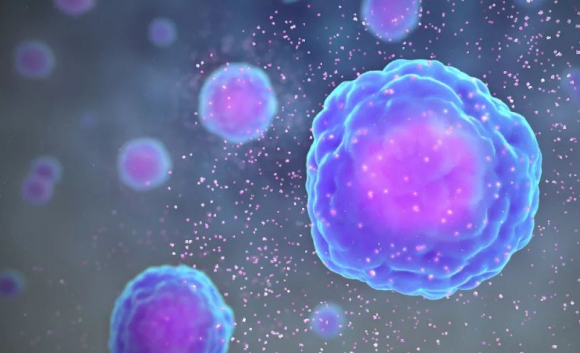 In alleviating the cytokine storm that causes respiratory distress, pro-inflammatory molecules in the lungs need to be targeted, not those detectable in the bloodstream. Researchers compared pro-inflammatory molecules in the blood and lungs of 45 people suffering from severe lung inflammation by COVID-19. What triggers hyperinflammation in the lungs of individuals severely affected with COVID-19 cannot be inferred from what is measured in the bloodstream. This fact should be taken into account if we hope to design effective drugs to reduce morbidity and mortality in people exposed to the cytokine storm induced by COVID-19. This is the conclusion reached by researchers at the Institute’s Research Centre and from University of Rabat after comparing the pro-inflammatory molecules present in the blood and lungs of 45 individuals in whom COVID-19 had required intubation.
In alleviating the cytokine storm that causes respiratory distress, pro-inflammatory molecules in the lungs need to be targeted, not those detectable in the bloodstream. Researchers compared pro-inflammatory molecules in the blood and lungs of 45 people suffering from severe lung inflammation by COVID-19. What triggers hyperinflammation in the lungs of individuals severely affected with COVID-19 cannot be inferred from what is measured in the bloodstream. This fact should be taken into account if we hope to design effective drugs to reduce morbidity and mortality in people exposed to the cytokine storm induced by COVID-19. This is the conclusion reached by researchers at the Institute’s Research Centre and from University of Rabat after comparing the pro-inflammatory molecules present in the blood and lungs of 45 individuals in whom COVID-19 had required intubation.
Obesity Linked to Alterations in an Area of the Brain
Obesity results in physical changes that are clearly visible to the naked eye, but its anatomical effects do not stop there. A meta-analysis based on data obtained through medical imaging techniques being sophisticated reveals that obesity is associated with alterations in a region of the brain involved in decision-making and emotion regulation. Details of this study that is supervised by Dr. Andréanne Michaud at Université Laval’s School of Nutrition and at the Institute’s Research Centre just came out in Neuroscience and Biobehavioral Reviews.
One of the Century’s Best Papers in the Journal Physiological Reviews
A 2013 article published by Drs. André Tchernof (an investigator in the obesity–type 2 diabetes–metabolism component) and Jean-Pierre Després (an investigator in the cardiology component) in the prestigious journal Physiological Reviews is on its list of 100 most-cited papers over the last century. The article entitled “Pathophysiology of Human Visceral Obesity: An Update” has garnered 1177 citations since its publication. The first issue of this journal from the American Physiological Society was published in 1921 and the list of the 100 most-cited papers since its foundation was generated in order to celebrate its 100th anniversary. The American Physiological Society believes that “these articles written by pioneers and forward thinkers in their field provide an in-depth discussion of fundamental mechanisms and highlight all the translational and clinical implications” [. . .] “These articles with their thousands of citations have had a major effect and provided a basis for early-career scientists as they get into a research area.” The Tchernof-Després paper is in an interesting fashion one of the three most recent on the list, underscoring its important impact and rapid accumulation of citations since it was published.
Congratulations to the Students, Recipients of the 2021 Annual Scholarship Competition
The Research Centre offers for more than 15 years a scholarship program for students registered in master’s or doctoral degree as well as being enrolled in a postdoctoral training, not benefiting from one of a granting agency. This competition, supported by the IUCPQ Foundation in partnership with Desjardins, contributes to recruiting highly qualified candidates and thereby increasing significantly their productivity.
The evaluation committees were composed this year of Drs. Benoît Drolet, Olivier Boucherat and Alexandre Caron (for those at the doctoral and postdoctoral levels and clinical fellows) and Drs. Marie-Renée Blanchet, Mathieu Laplante and Benoît Arsenault (for those at the master’s level). Nine students in total benefited from these scholarships, namely: Volatiana Rakotoarivelo (Dr. Nicolas Flamand), Jyoti Sihag (Dr. Vincenzo Di Marzo), Audrey Drapeau (Dr. Patrice Brassard) (Desjardins scholarship – PhD level), Alexandre Arnold (Dr. Richard Kinkead), Jules Mesnier (Dr. Josep Rodés-Cabau), Marie-Ange Fleury (Dr. Marie-Annick Clavel) (Desjardins scholarship – MSc level), Édouard Marques (Dr. Patrice Brassard), Jérôme Bourgault (Dr. Benoît Arsenault), Geneviève Pelletier (Dr. Andréanne Côté). The Desjardins scholarships are awarded to two students being qualified at the number one position in their category.

Bottom row: Jérôme Bourgault, Jules Mesnier, Volatiana Rakotoarivelo, Jyoti Sihag
Reprocessing and Decontamination Project for N95 Masks
Ms. Nathalie Turgeon, PhD in microbiology, and research professional in Dr. Caroline Duchaine’s team, presented in September 2021 the results of the reprocessing and decontamination project for N95 masks over the course of the COVID-19 pandemic at the Institute during a conference of the Institut de recherche Robert-Sauvé en santé et en sécurité du travail.
Rankings 2021: Two Researchers from the Research Centre among the World’s Most Influential Scientists
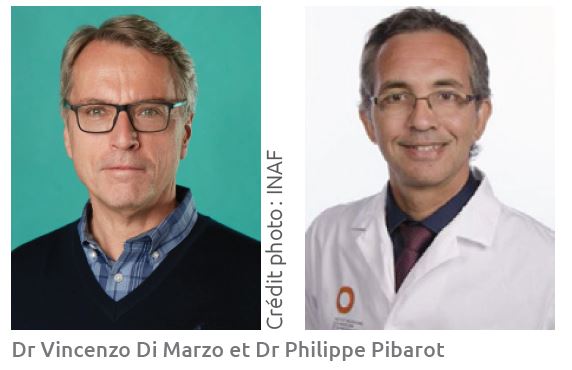 Researchers from the Research Centre are included one more time in the prestigious annual ranking of scientists, whose works are the most frequently cited in the entire world. This list is drawn up by Clarivate Analytics, a corporation that holds and manages several scientific journals. This year’s two researchers are Drs. Vincenzo Di Marzo and Philippe Pibarot.
Researchers from the Research Centre are included one more time in the prestigious annual ranking of scientists, whose works are the most frequently cited in the entire world. This list is drawn up by Clarivate Analytics, a corporation that holds and manages several scientific journals. This year’s two researchers are Drs. Vincenzo Di Marzo and Philippe Pibarot.
Marie-Annick Clavel and Yohan Bossé: Virtuoses de la santé 2021
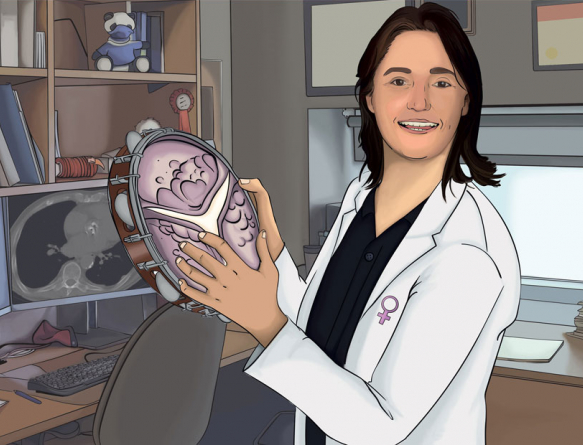
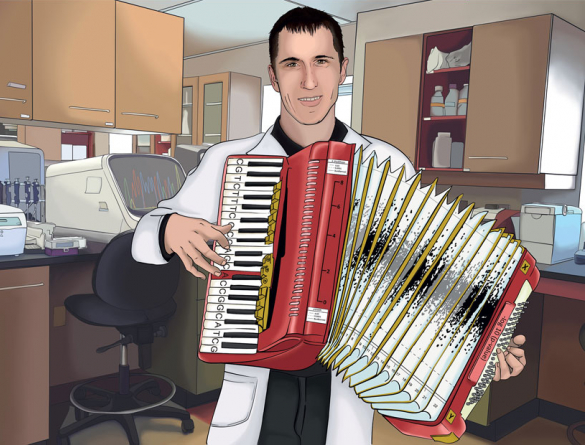
Université Laval’s tribute to holders of Canadian research chairs. Discover two Institute researchers’ fields of research through illustrations that show their eminent knowledge, as musicians who master their art do in an orchestra. Their commitment to population health affirms our value, which is social responsibility!
Dr. Sébastien Bonnet Appointed Director of an American Heart Association’s Council
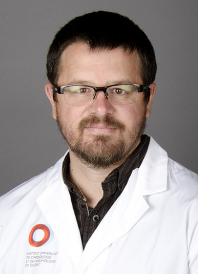 Dr. Sébastien Bonnet, recognized, in particular for his research in the cardiovascular field that led to the discovery of the mechanism causing pulmonary arterial hypertension, has just been named director of an American Heart Association’s Council. Dr. Bonnet will be responsible for all the research, training and guidance in pulmonary vascular disease, resuscitation and heart failure in critical care. He is the first Quebecer and the youngest in the history of this association council to be appointed.
Dr. Sébastien Bonnet, recognized, in particular for his research in the cardiovascular field that led to the discovery of the mechanism causing pulmonary arterial hypertension, has just been named director of an American Heart Association’s Council. Dr. Bonnet will be responsible for all the research, training and guidance in pulmonary vascular disease, resuscitation and heart failure in critical care. He is the first Quebecer and the youngest in the history of this association council to be appointed.
Five of a Kind Publication: First in the Field of Publishing in Respiratory Health
Dr. Louis-Philippe Boulet, respirologist, distinguishes himself as a senior author of international practice guides in asthma. This is an outstanding recognition and probably a first one in the area of publication in respiratory health.
*From the 2021-2022 Annual Report
